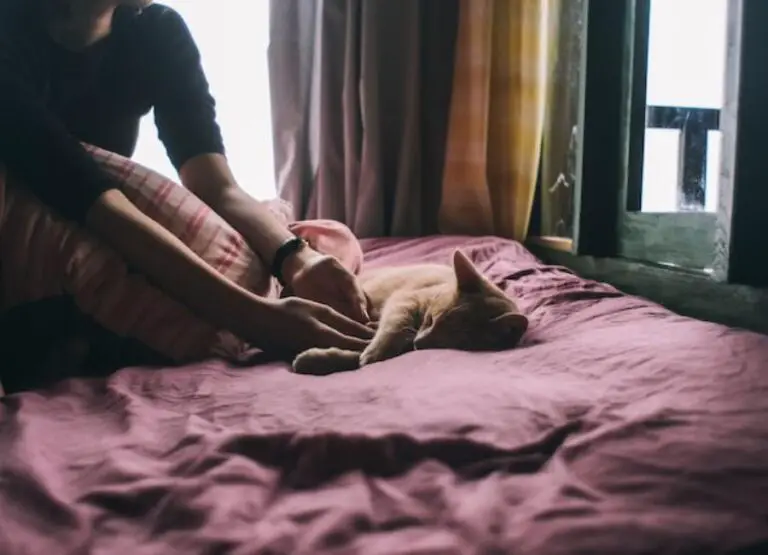My Indoor Cat Wants To Go Outside: 15 Reasons & Solutions

A group I am part of has been discussing the topic My Indoor Cat Wants To Go Outside, as a big fan of cats with years of experience living with cats, I decided to draw up this post to address the question.
In this post, we will be discussing reasons why you shouldn’t let your indoor cat go outside, why your indoor cat wants to go out.
We will also discuss how to stop your cat from wanting to go outside because allowing your cat to go outside without your supervision has lots of disadvantages which we will outline and discuss too.
So as a cat lover and owner, read through to find out more about how to keep your cat happy indoors.
What you get in this post:
- Why indoor cats want to go outside.
- Why you should take your cat outside under your supervision.
- Why you shouldn’t let your cat go outside without your supervision.
- How to stop your cat from wanting to go outside and keep them happy.
My Indoor Cat Wants To Go Outside
Some indoor cats prefer the outdoors and may appear dissatisfied with their current living situation. This is because they are not allowed to express their natural instincts (hunting), they are depressed, stressed, bored, lack mental stimulation, frustration, suffering from anxiety, they have been neglected by their owners, or they are not well cared for.
All these are common reasons why your indoor cat wants to go outside, even without your supervision.
There are just too many dangers of letting your cat go outside without your supervision, however, some of the dangers depend on your location.
Before we get to the dangers of letting your cat outside, let’s quickly outline and discuss why indoor cats want to go outside.
Why indoor cats want to go outside
Here are some common reasons why your cat might want to go outside:
- The cat wasn’t neutered from the kitten stages.
- There isn’t enough mental stimulation indoors.
- Inadequate socialization of the cat.
- Hunting instincts or prey drive.
- Abuse and neglect from loved ones.
- Too much noise indoors.
- The arrival of a new family member or pet.
- There are just too many dirty litter boxes.
- You didn’t cat-proofing your house.
- Death threat from your home.
- Out of desperation.
- Too much stress indoors.
- Out of frustration.
- The cat is having any form of depression.
- Curiosity.
Why you should take your cat outside
Here are some common reasons why you should take your cat outside under your supervision once or twice a week:
Taking a cat outside helps to minimize undesirable habits
Unwanted habits like clawing and urinating are decreased when you take your cat outside.
Most cat owners and animal behaviorists feel that walking your cat may alleviate 40% of indoor cat behavioral issues.
Regularly taking your cat outside can help to reduce undesirable behaviors including biting, nipping, scratching, and urinating.
Some of these problems are developed due to separation anxiety, boredom, or loneliness.
Taking cat for a walk outside encourages the cat sociability
Taking your cat outside strengthens the human-cat bond and alleviates a number of fear-related issues.
Allowing your cat outside gives it the opportunity to interact with other animals and other cats, which will enhance its social life.
Taking your cat outside can assist it in being more socialized and learning to form bonds with other animals while remaining calm.
Taking cat outside for walks simplifies vet or grooming appointments
Strolling your cat during your free time may help ensure that your cat is not scared of seeing the veterinarian or groomer at any time.
The more you let your cat interact with other people and animals outside, the more confident they will become.
If you always walk your cat outside in your leisure time, you’ll have fewer problems visiting your veterinarian.
Taking a cat outside for a walk is a form of exercise
Cats are naturally sociable, active, and vibrant creatures who require a lot of stimuli to stay healthy and happy.
Allowing your cat to accompany you outside is a great way to get him some additional exercise.
Most cats are overweight, so take them on a walk to help them get some exercise and lower their risk of becoming obese.
Walking with your cat for 9 to 25 minutes will help you get some exercise that he would not receive inside.
Taking cats outside boosts the cat’s self-esteem
Allowing your cat outside may assist boost his or her confidence because most cats are shy and avoid humans and other pets.
Socializing your cat with other animals, whether dogs, cats, or humans, can help your cat feel more confident.
Your cat will feel more at ease with other animals if he spends more time outside.
Although this is due to their shyness and lack of self-confidence when approaching new persons, cats are considered to be aggressive toward other cats or dogs.
Taking cats outside is a great way to reduce depression and isolation
Cats are among the world’s brightest pets, yet they may become bored fast, leading to behavioral issues.
Taking your cat outside to play is a great way to keep them happy and prevent loneliness-related behavior.
Most cats suffer from separation anxiety, which may be eased by taking them outside on a leash and harness.
When cats are walked on a regular basis, they are known to be quite active and rarely become bored or lonely.
Taking cats outside help them to exhibit natural instincts
Allowing your cat to go outside and explore enables them to follow their natural inclinations.
Allowing your cat to exhibit their natural impulses is one of the many benefits of bringing them outside.
They’ll be able to scratch trees, patrol their area, and employ their natural hunting instincts while outside.
This is especially useful in rural areas where rodent populations are high.
Make time to play with or walk your cat, as this is one of the leading causes of indoor cat emigration.
Why you shouldn’t let your cat go outside
Here are the most common reasons why you shouldn’t let your cat go outside without your supervision:
The cat may be killed by predators
Predators are larger animals that feed on smaller creatures. They can be found in the wild as well as in the forest.
The number of predators in a certain region influences how long a cat can live there; the higher the number of predators, the worse the cat’s chances of survival.
On the other hand, the fewer predators in a given region, the better the cat’s chances of survival.
Of course, an indoor cat who wanders into the woods will perish if there are hungry wolves in the vicinity.
Outside, domestic cats can be killed by a number of animals or predators, including the following:
- Coyotes
- Hawks
- Foxes
- Raccoons
- Cougars
- Snakes, etc.
The cat will get illnesses or parasites outside
Some environments are more contaminated than others; an indoor cat living in a dirty environment, for example, is more susceptible than one living in a clean one.
This indicates that the fewer parasites present in a certain area, the better the chances of an indoor cat surviving there.
The higher the number of parasites and infectious diseases in a certain location, the less probable an indoor cat would live.
Here are some fascinating cat and parasite topics to investigate:
- Symptoms of worm infestation in cats
- How long does it take for worms to disappear after your cat has been dewormed?
- Worms may be acquired in a variety of ways in indoor cats.
- How parasites are transmitted to indoor cats.
The cat might be poisoned either purposefully or unintentionally
If you let your cat roam outside without supervision, you risk poisoning them, either intentionally or inadvertently.
Some people still detest cats, so just because you enjoy them doesn’t mean that everyone else does.
There’s a high chance your cat may consume poison if you let him out without supervision.
Despite the fact that the poison is meant for larger, more dangerous rodents, your cat might become a victim.
Moving cars might crush the cat
Cats are superb hunters and will not stay in one location for long if left outside unsupervised.
They have access to both major and minor roads, putting them in danger of dying in a car accident.
Consider where you live before letting your cat explore the outside world without your supervision.
Allowing your cat to go outdoors alone, especially if you live in a congested area, is a guaranteed way for your cat to get hit by passing automobiles.
It’s possible that the cat may stray off and become lost
Cats are agile and fast, jumping over big fences and barriers with ease.
Cats are among the most intelligent felines on the planet, and they can sprint in a fraction of a second.
Outside cats are prone to wandering or roaming and are frequently uncontrolled.
Although cats are superb hunters, when following a mouse, they may become disoriented or travel too far from home.
If you have to let your cat outside, make sure it’s microchipped or has a tracker implanted so you can keep track of it.
There are numerous methods for locating a missing cat; but, with the aid of their owners, many missing cats may be discovered and brought home.
The cat might be taken in by another cat lover
If your cat goes missing or is taken by another cat lover who isn’t a decent citizen, it’s time to say goodbye. The odds of your cat returning are little to none.
If, on the other hand, another wonderful cat lover abducts your missing cat, there’s a strong possibility it’ll be found nearby or made public.
Have in mind that, as much as you like your cat and want to keep it with you at all times, another cat enthusiast may already have several cats and is wanting to expand his or her collection.
This is your cat’s ultimate farewell if he or she has ever been held by such people. One of the reasons you should never let your cat out is because of this.
The cat might be seized by animal control officials
When a cat is left outside, it nearly always causes difficulties, and animal control will remove it if it gets into trouble or causes problems.
Every city has an animal control organization tasked with removing stray animals.
There’s no assurance, though, that your cat won’t trespass and cause difficulties. These are some reasons why domestic cats can’t survive outside.
If you let your cat out and animal control takes it away, you’ll be asked a series of questions that will take time and maybe money to answer.
To spare yourself the bother, keep your cat inside. Read more: 13 Top Reasons Why You Shouldn’t Let Your Cat Outside.
How to stop your cat from wanting to go outside
Here are some common ways to stop a cat from wanting to go outside without your supervision:
Establish a schedule for your cat on a daily basis
By providing your cat something to do at all times, keeping a consistent daily schedule may help him stop wanting to go outside.
Giving your cat high-quality food and plenty of attention will distract him or her from the desire to go outside.
This will benefit you since you will be glad to know that your cat is safe from the dangers of going outside.
Allowing your cat outside may lead to a variety of problems, so we’ll go over a number of them below.
Maintain the cleanliness of your cat’s litter box
Cats are among the cleanest pets you can have if they are properly trained.
Cats do not like to use a filthy litter box, which may cause them to seek out a location where they feel conditions are better.
Because you choose to keep a cat as a pet, it is your responsibility to provide for them, including feeding, cleaning, and caring for them.
Regularly inspecting the litter box can allow you to anticipate when your cat is attempting to become unwell and contact the doctor.
The cat may be cared for with regular clean water in the water and high-quality food.
As a result, treating your cat with comprehensive care reduces the probability that your cat will want to go outside.
Get you neutered or spayed
This is the main reason why your cat prefers to be outside.
Spaying or neutering your cat between the ages of 8 and 12 weeks is recommended as long as your cat is healthy.
If a female cat is not spayed or neutered, she will go into season regularly, and no amount of effort will keep her from going outside unless you lock her up.
In pursuit of an escape route, a cat in heat will wander from one area to the next.
If you try to block the cat’s route, it could attack you if you’re not careful.
This time affects any cat that hasn’t been spayed or neutered, and some cat owners who don’t want to spay can get a male cat instead.
If you acquire a second cat, you must be prepared to accept new kittens and eventually convert them into a breeder who will always have kittens around.
Some cat owners may neuter one cat and leave the other alone, but history shows that this nearly always leads to a fight between the two cats.
Mating is one of the reasons a cat may leave the house for a few days.
As a result, spaying or neutering your cat is important to avoid having to look for it.
According to experience, a male cat can go a considerable distance in search of a female cat.
As a result, spaying or neutering a cat will make it less likely for it to want to go outside.
Find out more about why your male and female cats want to leave home.
Cat-proofing your house
This is merely a way to keep your cat from going outside, and it may or may not belong on this list, but be certain that your cat wants to go outside because it sees a way out.
When you leave the house, do not stay at the door to say goodbye to your cat, since this will encourage your cat to go outside.
All conceivable escape routes for a cat should be closed up. If you notice your cat attempting to flee the house, instantly lock the door and start distracting techniques.
When a cat finds a way out, it will want to go outside all the time.
Create an atmosphere that is cat-friendly
A cat-friendly setting is one in which the cat has all he or she needs to feel comfortable.
As a result, the environment you create for your cat is extremely important.
Cats are territorial creatures who prefer to be in control of their environment at all times.
Creating a healthy cat environment offers your cat a sense of control and reduces the desire for your cat to go outside.
You may utilize your basement as a cat territory while keeping it functional if you have one.
Cats prefer to nap in the afternoon in a calm, peaceful environment.
You may turn a section of your basement or garage into a cat kingdom that is only for your cat by providing cat trees or shelves for an afternoon nap.
If you give this cat tree or shelves, your cat will seek refuge in your basement when it’s noisy or hot outside, or even while you’re not home.
You’ve reduced the possibility that your cat will want to go outside after he’s been acclimated to the cat-friendly environment in your basement.
Provide your cat with more interactive and entertaining toys
Getting beautiful play toys for your cat may keep him engaged for several hours, which is a good way to discourage him from wanting to go outdoors.
Every cat owner has toys, but the issue is: what sort of toy do you have, and is it useful in deterring your cat from going outside?
If you want to keep your cat from going outside, you could buy a moving toy or interactive toys.
Cats are curious pets who will chase a moving toy for hours until they tire of it.
This will enable them to focus on anything other than their want to go outside or a way of distraction.
A moving or dancing rat toy may keep your cat entertained while you are away.
Set aside certain toys solely for the purpose of preventing your cat from going outside.
This assortment of toys should be placed near your cat’s bed, not near an exit door, so that they can simply sleep it off when they’re weary.
Installing a cat tree and cat shelves is a great way to restrict your cat from going outside.
Several cats are skilled climbers and can spend hours climbing and descending a cat tree; nevertheless, most cats consider this to be exercised.
If you get a good cat tree with various top sections, your cat will want to examine all of them at the same time, which will keep the cat occupied.
Cat nails become old and wear out, but most cats will want to go outside to scratch them off so that new ones may grow in their place.
Read the full article on how to stop a cat from wanting to go outside.
How to keep a cat happy indoors
Here are some suggestions for keeping your cat happy at home:
- Keep your house noise free.
- Have some fun with your cat.
- Take a walk with your pet.
- Create a stress for environment for your cat.
- Create a small hunting grounds for your cat with moving mouse.
- Your cat will benefit from mental stimulation.
- Create and stick to a working daily routine.
- Give your cat space when they want to be alone.
- Give your pet some goodies.
- Lots of interactive gadgets should be available.
- Get your cat a second pet.
- Take your cat for a hike.
- Provide your cat with high-quality food.
- Supplement your cat’s diet with beneficial nutrients.
- Brush your cat once a week at the very least.
- Once in a while, take your cat to the vet for a checkup.
- Teach your cat to like animated films.
- Play a game on the computer with your cat.
- Hide goodies all throughout the home.
- Play a game of puzzles with your cat.
- Always reward your cat for excellent behavior.
- Neuter your cat from the kitten stages.
I hope your concerns about My Indoor Cat Wants To Go Outside were resolved by this article!!


![How Long Do Cats Usually Live [11 Factors to Consider] How Long Do Cats Usually Live](https://petcreeks.com/wp-content/uploads/2023/10/pexels-alina-bystrova-11570743.jpg)

![Bacterial Infections in Cats Symptoms [9 Signs] bacterial infections in cats symptoms](https://petcreeks.com/wp-content/uploads/2021/03/Symptoms-of-bacteria-infection-in-cats.jpg)

